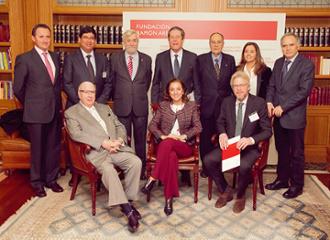Proyectos de investigación
Comienza el contenido principal
Technological innovation in developing countries: theoretical analysis and empirical evidence in Sub-Saharan Africaógica en países en desarrollo: análisis teórico y evidencia empírica de África Subsahariana
Economía Internacional

Investigador Principal: Pedro Mendi Güemes
Centro de investigación o Institución: Universidad de Navarra. Pamplona.
Abstract
Technological innovation holds promise as a way to help numerous people in less developed countries out of poverty. This project analyses four basic issues. First of all, what are the characteristics of companies which introduce new products and/or processes in less developed countries? Secondly, how do these companies generate their innovations? Thirdly, what are the consequences of technological innovation? And, finally, what are the main obstacles to innovation encountered by these companies?
The study of these questions will shed light which will permit a better design of both public policies and business strategies. In the framework of this project, the aim is to develop theoretical models, based on the empirical evidence available, which incorporate circumstances inherent in those countries, such as a relatively low capacity to absorb more advanced technology, institutional factors which weaken the protection of intellectual property rights, and the competitive pressure exercised by companies in the informal sector, which often exceeds the formal sector of the economy in terms of employment.
The main geographical sphere studied for this project is Sub-Saharan Africa countries. Due to its cultural and institutional factors, this region has traditionally been considered as having low capacity for technological absorption, which has impeded local innovation and the transfer of technology from advanced countries. However, the recent development of M-Pesa, a system of payments by means of the mobile phone, in Kenya, is a significant example of autochthonous innovations. This innovation responds to local needs of the population and its development brings enormous gains in efficiency, as well as the inclusion, from the financial point of view, of part of the population which was previously excluded from the banking system. The ultimate aim of the project is precisely the design of policies to facilitate the development of innovations like M-Pesa, which will have a real impact on the lives of millions of people.
-
 Actividades relacionadas
Actividades relacionadas
-
 Proyectos relacionados
Proyectos relacionados
-
 Noticias relacionadas
Noticias relacionadas
-
 Publicaciones relacionadas
Publicaciones relacionadas
-
 Tesis relacionadas
Tesis relacionadas
 Actividades relacionadas
Actividades relacionadas
-
30
ene
2024
Conferencia Experimentación, ciencia y lucha contra la pobreza: una retrospectiva de 20 años Madrid, Martes, 30 de enero de 2024, 19:00 horas
-
11
mar
2024
Conferencia ¿Qué anticipan los mercados de bonos sobre ahorro, inversión y tipos de interés? Madrid, Lunes, 11 de marzo de 2024, 19:00 horas
-
18
jun
2024
Seminario Modelos de lenguaje de gran tamaño (LLMs) y aprendizaje automático para datos no estructurados Madrid, 18,19, 20, 21 de junio de 2024
 Proyectos relacionados
Proyectos relacionados
- Cómo prevenir el contagio durante las crisis de deuda internacionales 2012 Investigador Principal: Antonio Moreno Ibáñez Centro de investigación o Institución: Universidad de Navarra. Pamplona.
- Innovación tecnológica en países en desarrollo: análisis teórico y evidencia empírica de África Subsahariana 2014 Investigador Principal: Pedro Mendi Güemes Centro de investigación o Institución: Universidad de Navarra. Pamplona.
- Propagación de la incertidumbre buena y mala a través de la economía global 2017 Investigador Principal: Helena Chuliá Soler Centro de investigación o Institución: Universidad de Barcelona.
 Noticias relacionadas
Noticias relacionadas
-
Mike Savage (LSE): "Las políticas de Trump aumentarán la desigualdad"
Publicado el 29/11/2016
-

Carmen Vela: "La bioeconomía ayudará a resolver los retos del Planeta"
Publicado el 01/02/2017
 Publicaciones relacionadas
Publicaciones relacionadas

 Tesis relacionadas
Tesis relacionadas
- Desigualdad Multigeneracional en España Investigador Principal: Andrea Pîzzo Centro de investigación o Institución: Universidad Carlos III de Madrid.
Fin del contenido principal

